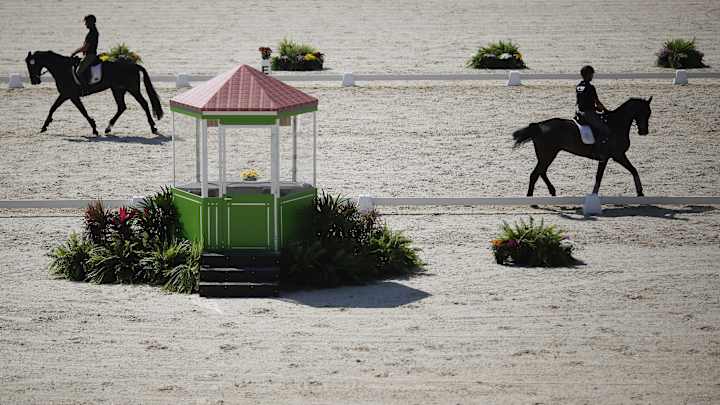Rio Olympic official: 'No risk' of glanders at equestrian

RIO DE JANEIRO (AP) In a story Aug. 6 about the equine disease glanders, The Associated Press reported erroneously that 200 horses were participating in the Olympic test event. Only 19 horses were taking part.
A corrected version of the story is below:
Rio Olympic official: No glanders risk at equestrian
Rio Olympic official: `No risk' of lethal glanders disease at equestrian despite recent cases
By JENNY BARCHFIELD
Associated Press
RIO DE JANEIRO (AP) - A test event for 2016 Olympic equestrian began in Rio de Janeiro on Thursday, following an outbreak of the highly contagious and deadly disease, glanders.
Authorities have insisted the disease, which was discovered this year among horses stabled near Rio's Olympic Equestrian Center and can also infect humans, poses no threat to horses or riders.
The exact details of the outbreak at the Deodoro military complex, a sprawling installation in northern Rio that also houses facilities for other Olympic sports, remain murky.
In April, one horse stabled at Deodoro tested positive for the disease, and results for another animal came back inconclusive, said an Agriculture Ministry official, who declined to give his name in line with ministry policy.
The Rio outbreak followed the diagnosis of another case this year in neighboring state Espiritu Santo. That horse, which was euthanized, was thought to have taken part in a competition at the Deodoro complex, the official said, though he was unable to provide any more details.
The sick horses have been quarantined in Sao Paulo state, and the hundreds of other animals once stabled at Deodoro have been moved, said Mario Andrada, a spokesman for the local organizing committee.
The other animals have tested negative for glanders, though they will continue to be tested on a monthly basis, with results sent to a laboratory in Germany for analysis, he said.
The part of the complex where equestrian will be staged has been under quarantine and off-limits to horses and other animals since early February - even before the Rio outbreak - as a precautionary measure, Andrada added.
''We completed all the protocols, double-checked, triple-checked,'' he said. ''There is no risk whatsoever.''
Rio's Sociedade Hipica Brasileira riding club was also under quarantine pending the testing of the 264 animals stabled there, after horses from the military complex took part in an event at the club. But the ban on horses entering and leaving the club's premises was lifted this week after all the results came back negative, club officials said.
Felipe Gomes, the club president, stressed that horses stabled there are tested twice a month.
Rider Carlos Vinicius Goncalves da Motta, who represented Brazil at the 1992 Olympics in Barcelona, underscored the crucial importance of efforts to prevent the spread of glanders.
''They are very valuable horses, so if there is any risk (of contagion) you run the risk of people not wanting to take part in the (Rio) Olympics,'' he said, adding he was satisfied with the steps authorities have taken.
Equestrian governing body the FEI said in a statement it was ''aware of the situation,'' which now posed ''no threat.''
''We are confident that everything is being handled correctly,'' FEI said in an email, referring to the local Olympic organizing committee.
No horses have been sent from abroad to take part in the test events, which run through Sunday at Deodoro. Nineteen horses stabled in Brazil were participating, the FEI said.
Rio Mayor Eduardo Paes and Carlos Nuzman, who heads the local organizing committee, attended Thursday's events, and both were submitted to biosecurity measures including sanitizing shoe-dips.
Glanders is caused by bacteria that spread through direct contact with sick animals or, more commonly, thorough contaminated food, water, or equipment. It causes nodules on the lungs and liver that eventually lead to death, and animals diagnosed with the disease are generally swiftly euthanized. The disease is linked to crowded, unsanitary conditions at stables.
Glanders has been recorded since antiquity, and was unleashed as a biological weapon during World War I, attacking war horses and, to a lesser extent, their riders. Human-to-human contagion is exceedingly rare.
The disease was eradicated in the United States in 1934, and was largely eliminated in Europe decades ago, although an isolated case was recently registered in Germany. The illness is endemic in Brazil, particularly in the country's impoverished northeast, where it affects horses, donkeys, and mules.
